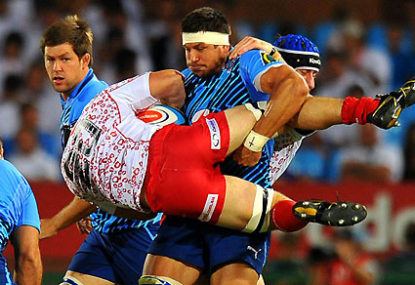Overall, this week’s Super Rugby was probably the poorest of the year so far. I’ve been thinking about why that may be.
Watching some of the games this weekend was in stark contrast to the legitimately very good rugby we’ve seen in the 2013 competition so far.
The Crusaders-Chiefs game was a high-intensity match with a lot on the line, and both teams executed Test match-style game plans fairly well. The Waratahs-Rebels wasn’t the most polished from either side, but there was some very enterprising rugby played in patches.
Those matches aside; the rest of the round didn’t really have the same attacking spark and overall execution of previous rounds.
The Sharks and Bulls match in Durban was the typical derby that never got out of first gear. Both sides seemed unable to do much but also appeared to be coached into a reduced game plan as well.
The Kings and Cheetahs saw a dreary first 40 minutes turn into a one-sided second 40. The game didn’t get any momentum until Kings had basically been dropped from the match for conceding two unanswered tries.
The Cheetahs couldn’t execute their attacking plan at speed without dropping the ball as soon as there was room to move in the first half. For the Kings it was just a matter of trying to keep it close, and they weren’t able to do that for longer than 50 minutes.
In Auckland the Blues went down to a very organised and composed Brumbies outfit that played well in the conditions on offer. In the rain they played a field position game and secured their try through effective opportunism.
The second half saw the Blues begin to effectively counter-attack the Brumbies’ incessant kicking and they looked to take control of the game until, invariably, their set piece let them down.
However, the Brumbies refused to kill them off and had to repel a number of last minute attacks to secure the win after completely dominating field position all night without looking intent on constructing a try for much of the match.
The less said about the Force and Highlanders in Perth the better – that match was hard to watch. I spent a good part of it with one eye on Youtube to see if Man of Steel, The Wolverine or The World’s End movie trailers suggested any will be worth my time this winter. During the final few minutes the match basically descended into a series of errors.
This round wasn’t very full of good rugby – I’ve spent a bit of time thinking about why that was the case.
What I’ve come to is the concrete realisation that our rugby season is now much more like the Northern Hemisphere than it ever has been and we’re seeing the fruits of it.
Many rugby fans are used to every single round of Super Rugby and every Test match being of the highest quality possible.
Now the reality is the season is long enough to see substantial lulls in performance and form as players are trying to measure their effort, vary recovery plans and manage injuries for a longer period of time than before.
Look at Liam Gill for a great example. One of the better rugby players in Australia for much of the first eight rounds of the competition has barely impacted a match for the last month. We all know he’s talented ,but he’s been worn down – and whether he knows it or not he’s also probably dealing with injury.
He bounced back to being one of the Reds good performers in a poor overall performance this weekend, suggesting his form is about to tick up again.
We’re used to acknowledging these factors for our rugby brothers in the North, whereas we have never had to deal with the impact of them quite so much.
The elongated Super Rugby season has added more games to the schedule, while also introducing the distraction of an international window into the competition to make things even trickier.
It wouldn’t be unfair to expect players who have been affected by selection, or non-selection, into their national squads to have thoughts about the Test series’ approaching while trying to prepare accurately for their Super Rugby teams.
We’ve already seen played out on in the national media a tug-of-war over Quade Cooper’s abilities and deployment for the Reds compared to the Wallabies – by Robbie Deans and Ewen McKenzie no less.
That wouldn’t have been such an emphasis when there was a clear divide between each part of the rugby calendar. Now they overlap and leave less time for preparation so we see these distractions added.
I have almost no doubt young players such as Aaron Smith view Super Rugby differently now they’ve tasted Test rugby as well. The amount of games a player can play for their nation now means they almost have two full seasons of rugby. It isn’t hard to see which one you would prepare most diligently for.
Commenters on The Roar have talked about Waratahs players, Ma’a Nonu and Israel Dagg in a similar way.
While we can’t absolve players for not performing in any team they are selected for, whether national or Super Rugby, the way our calendar operates now makes it more understandable.
I think this weekend, the 15th round of the Super Rugby competition, after most of the national squads have been announced, we’ve seen the results of teams trying to stay at a high level of performance over a longer Super Rugby season and the influence of a broken up international calendar over the players’ ability to prepare.
Our rugby players were both tired and probably somewhat distracted this week and it’s only May.





























































































